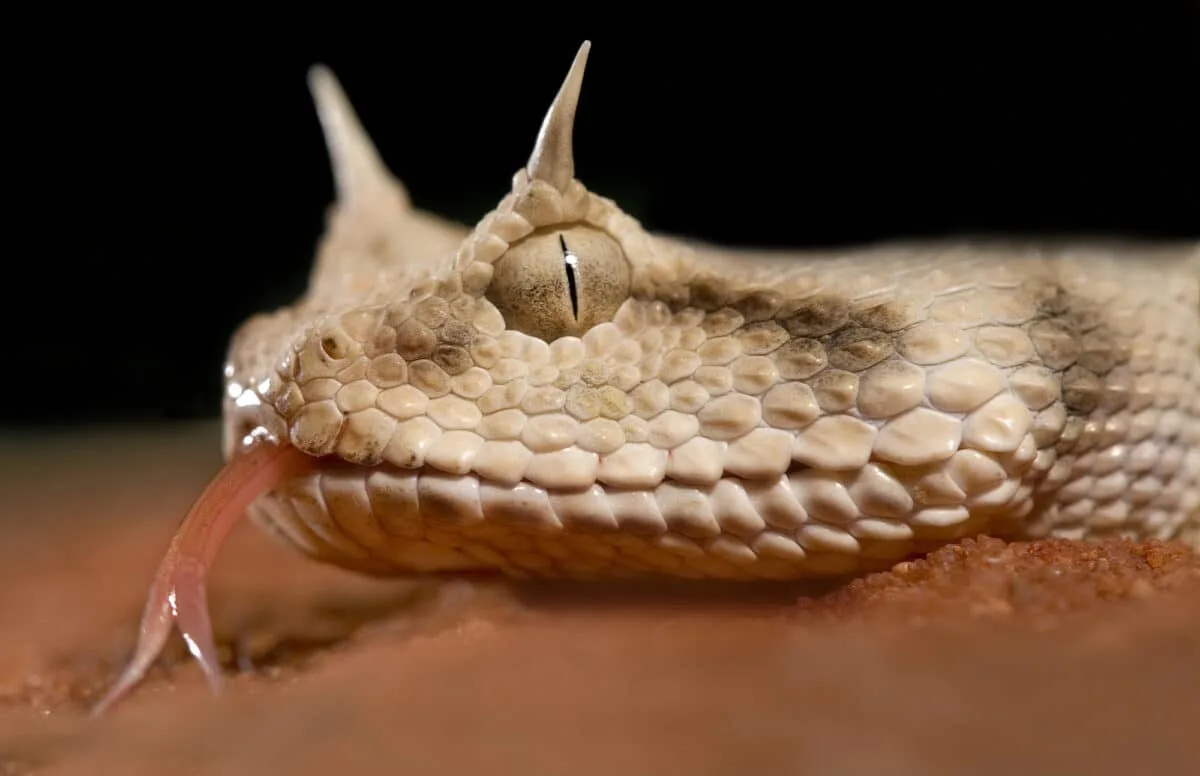Do you know what is worse than a regular snake bite? The horned snake bites. Horned snakes are among the most dangerous snakes in the world, and bites from them can be fatal. These snakes live in northern Africa as well as throughout the Arabian Peninsula.
These snakes are known as the “horned sand viper,” and they are considered sidewinders. They inhabit a variety of environments, from rocky outcrops to sandy deserts and vegetated oases. As their name implies, desert horned vipers often have horns above their eyes. These are single-elongated scales, but not all individuals have them.
In this blog post, we’ll discuss the potential dangers of horned snake bites and what to do if you ever suffer one. Read on to learn more!
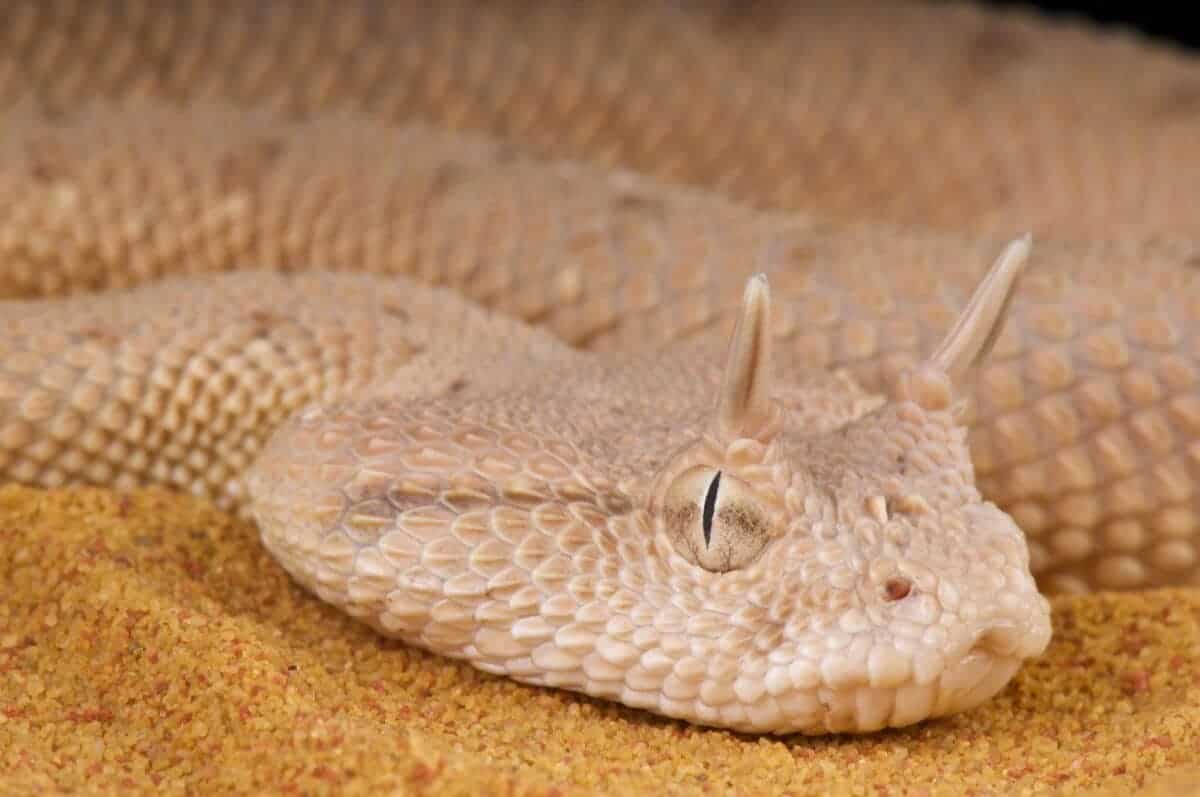
Slither ahead to any section below!
Appearance and Description
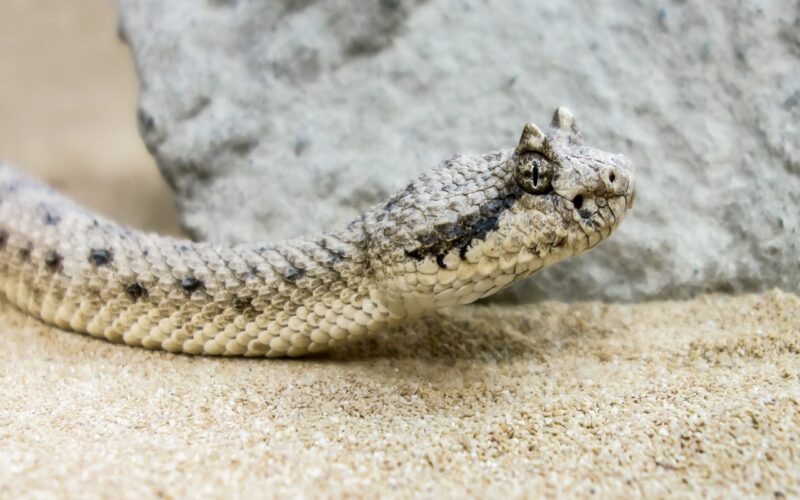
Horned vipers, otherwise known as saw-scaled vipers, are small but deadly snakes. These snakes are found throughout the Middle East and parts of Africa.
They have distinctive horns above their eyes, which give them their name. They use these horns to intimidate potential predators or prey.
Horned vipers also have rough, scale-like skin. This acts as a warning to humans and other animals that they should stay away.
But what happens when humans or animals come into contact with a horned viper? Unfortunately, the answer is not pleasant. Horned vipers have highly venomous bites. These cause severe pain and swelling, difficulty breathing, paralysis, and even death if left untreated.
These sneaky snakes can blend in with their environment. This is done so easily that it’s almost impossible to tell where they are hiding. Even when you think you have spotted one, they can pull off a quick escape by using their excellent camouflage abilities.
When provoked, the horned viper is known to behave aggressively, making it a species that people should stay away from.
The horned viper is known for its sneaky behavior. It blends in so well with its environment, waiting patiently until it spots a potential meal.
With an impressive array of sharp horns on its head, the horned viper is a formidable predator that should never be underestimated. Its sneakiness and cunning are just some of the reasons why this species has been able to survive in its environment for so long. When it comes to horned vipers, always watch your step.
Check out: Baboons Unleashed: The Ultimate Guide To Their World.
Venom and its effects
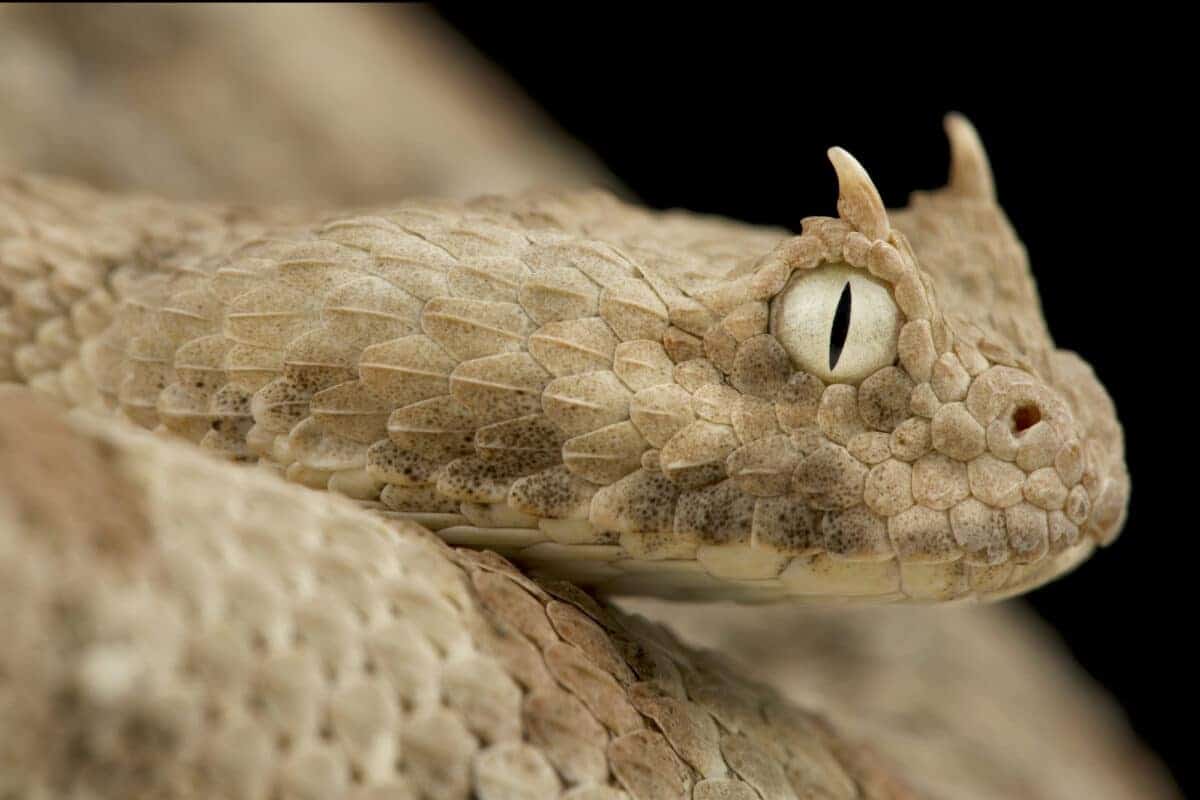
Though they are still regarded as the venomous creatures they are, a bite from a horned viper is not usually fatal. But still, their venom can be potentially dangerous. It contains powerful neurotoxins, which can lead to paralysis and even death if not treated quickly enough.
The venom also contains enzymes that help it break down food. As well as anesthetic properties to numb its prey before devouring them alive. Because of these components, it ranks among the world’s most dangerous snakes.
They may look small and innocent in appearance, but their powerful venom has been perfected by millions of years of evolution.
In short, horned viper venom is no joke; you should think twice before coming too close to these majestic creatures.
Injected directly into a victim’s bloodstream, it will induce severe pain, followed by swelling, nausea, and potentially even death, depending on the dosage and severity of the bite. It may take some time for symptoms to show up, but when they do, medical attention should be sought immediately.
Check out: Unleashing the Irresistible Charm of Beagles: A Dog Lover’s Guide.
Human interaction with Horned viper snake
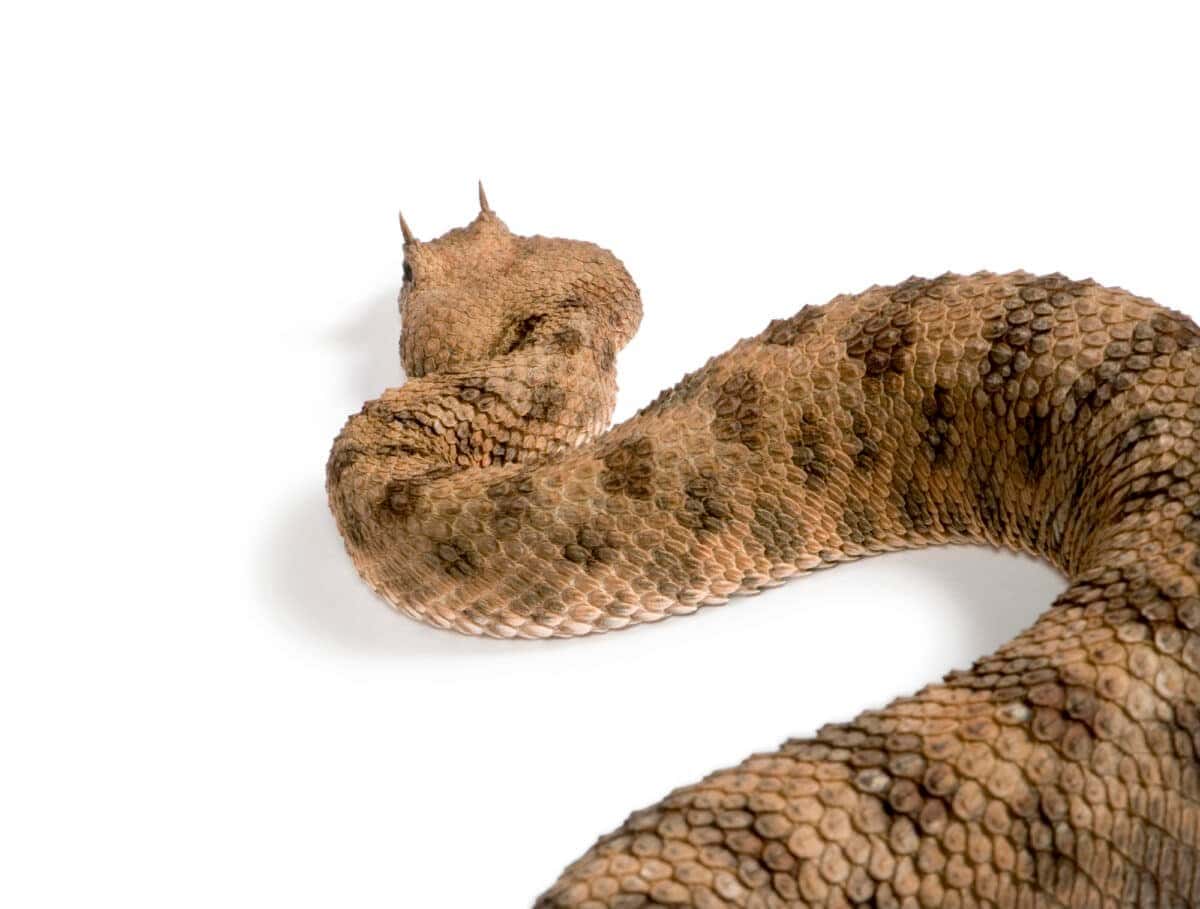
Humans have had a long and complicated relationship with horned viper snakes. When hunting, these snakes utilize ambush. They cover themselves with sand, so nothing but their eyes poke out like a crocodile hunting in the water.
For centuries, people have studied the behavior of horned vipers and used their venom in medicines for various ailments.
The intense curiosity surrounding these powerful predators has led to countless stories being handed down through generations about encounters with them.
Some describe brave hunters facing off against horned vipers in close quarters, while others tell tales of wise elders using cunning tricks to outwit them.
Despite this complex history, humans rarely interact directly with horned vipers, as only a handful of people are known to have encountered them in the wild without serious injury or worse.
Humans generally leave these snakes alone. For those brave enough to take on a horned viper, the risks are high, as these snakes can detect movement from up to three meters away and strike with unbelievable accuracy.
Desert horned vipers sit and wait, feeling for the vibrations of nearby prey and using their heat-sensing pit organs to detect them.
Many cultures have developed ways of dealing with these creatures through traditional rites or by using specially crafted tools such as hooks and snake tongs to handle them safely.
This has allowed us to understand more about this fascinating species without putting ourselves in danger.
Check out: The Longest Lived Species of Shark.
Symptoms of Horned Viper Snake Bite
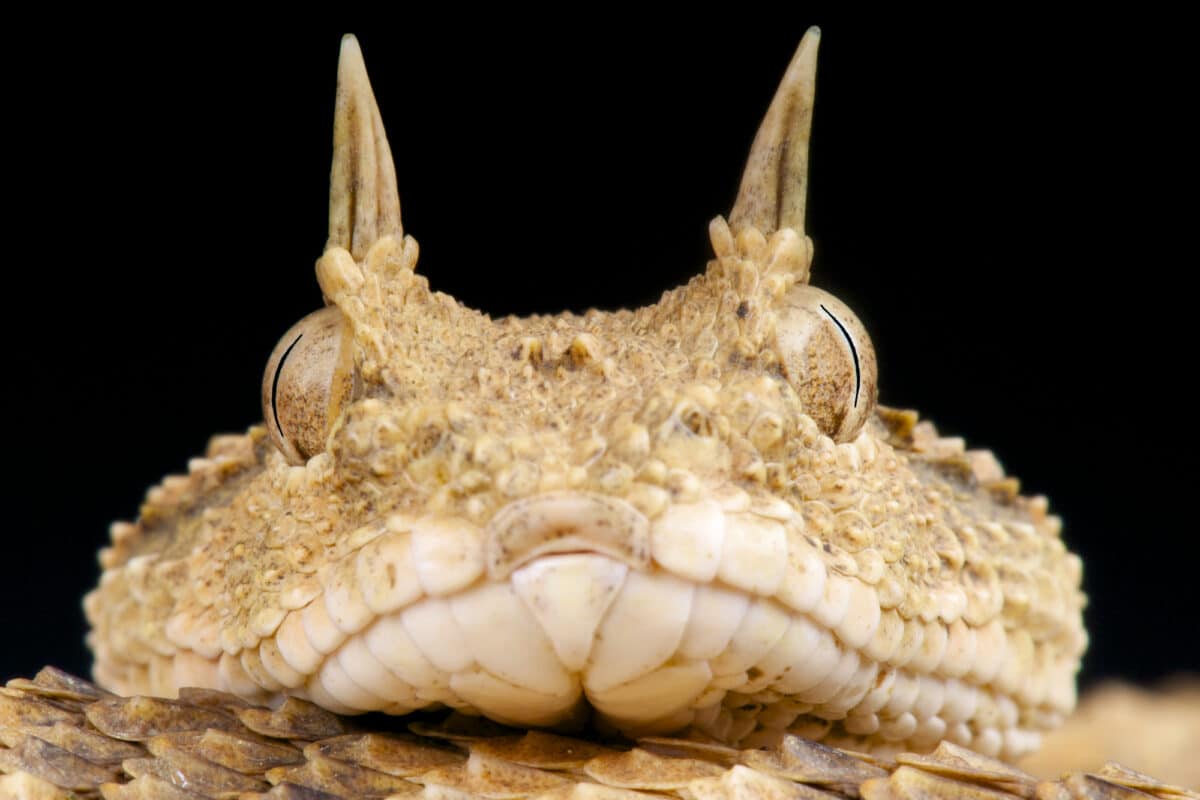
While bites are rare, the venom of the horned viper is highly toxic. It is important to be aware of the common symptoms associated with such an interaction before engaging in activities that could result in contact with this species.
- Common symptoms of a horned viper bite include intense pain around the site of the wound, accompanied by swelling, vomiting, dizziness, nausea, and even temporary paralysis in some cases.
- Victims may also experience difficulty breathing or have muscle spasms as a result of being bitten by one of these snakes.
- If antivenom is not administered quickly enough, victims may suffer from organ failure or death.
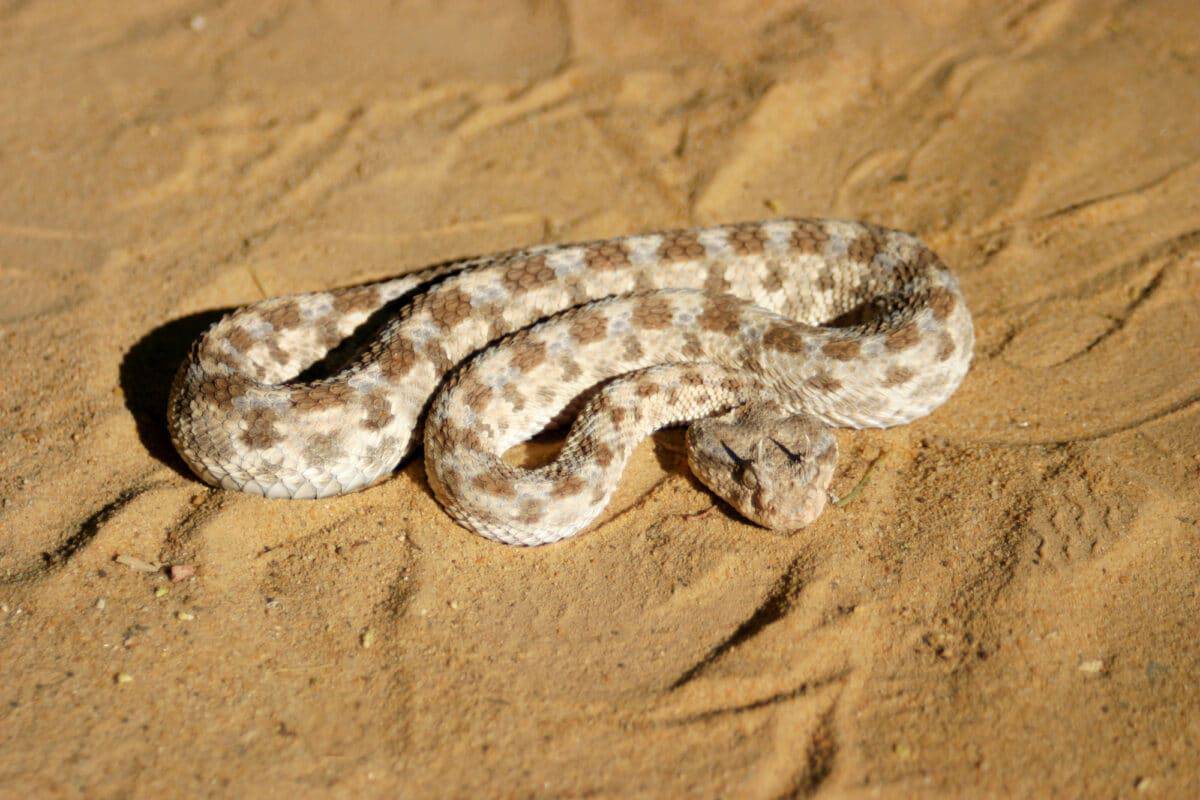
- Swelling and redness around the bite site: You’ll likely experience swelling around the bite as well as redness, which can last for several days.
- Pain at the injection site: The pain associated with a horned viper snake bite will be more intense than other types of bites.
- Tingling sensation: A tingling feeling may also occur around the bite, which can indicate that venom is traveling through your body.
- Nausea and vomiting: You may become nauseous or even vomit after a horned viper snake bite, so it’s important to get medical help as soon as possible if you experience these symptoms.
- Dizziness and confusion: If you feel faint or confused after being bitten by a horned viper snake, it’s definitely time to seek emergency care.
If you’ve been bitten by a horned viper snake, it’s essential to seek medical attention right away. Early treatment can mean the difference between life and death. Look out for any of these symptoms and stay vigilant. With early recognition and quick action, you can make sure that your experience with a horned viper snake bite is as safe as possible.
Prevention of Horned Viper Bite
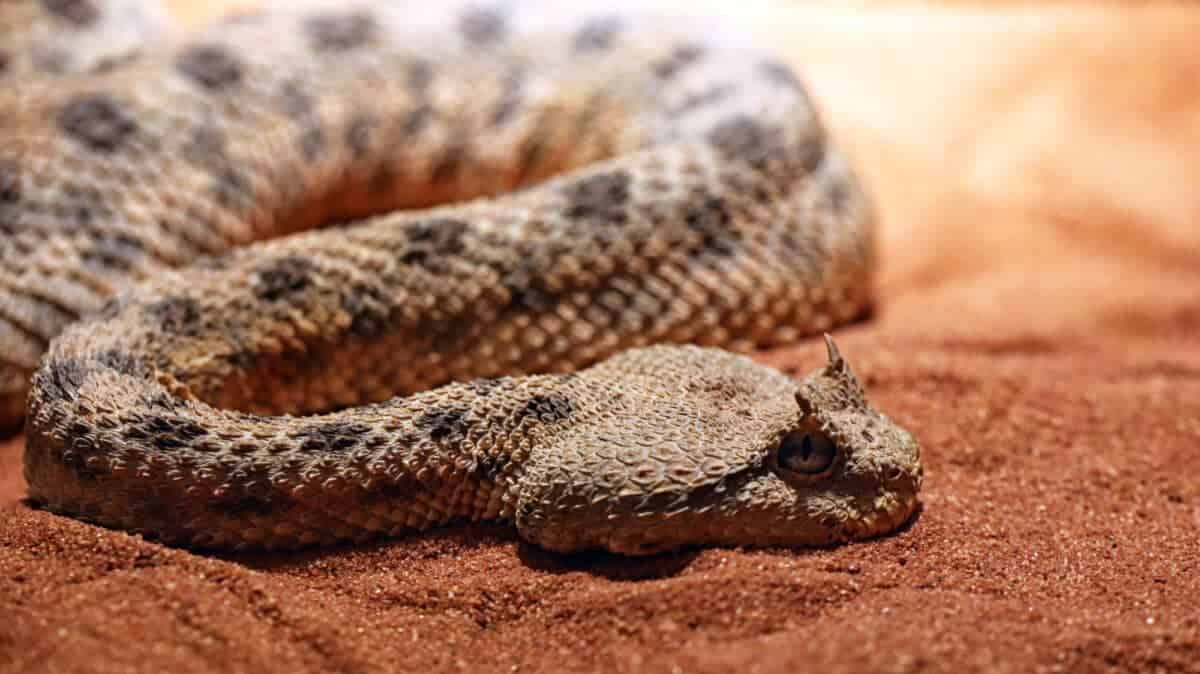
The best way to prevent a horned viper snake bite is by avoiding areas where these snakes may live. Additionally, to not disturb them if they are seen.
If you are camping or hiking in an area known for having horned vipers, wear protective clothing. Such as long pants and boots to help protect your skin from any potential bites.
Keeping your pets on leashes and staying on established trails will prevent them from coming into contact with snakes. It’s better to always carry a first-aid kit while in the field in case of emergency situations.
By taking these simple safety measures, you can drastically reduce the risk of being bitten by a horned viper snake.
If a horned viper snake does bite you, seek medical attention as soon as possible.
Horned vipers are highly venomous snakes. Therefore, it is important to get treatment immediately in order to minimize any potential harm or complications.
Reader’s Takeaway
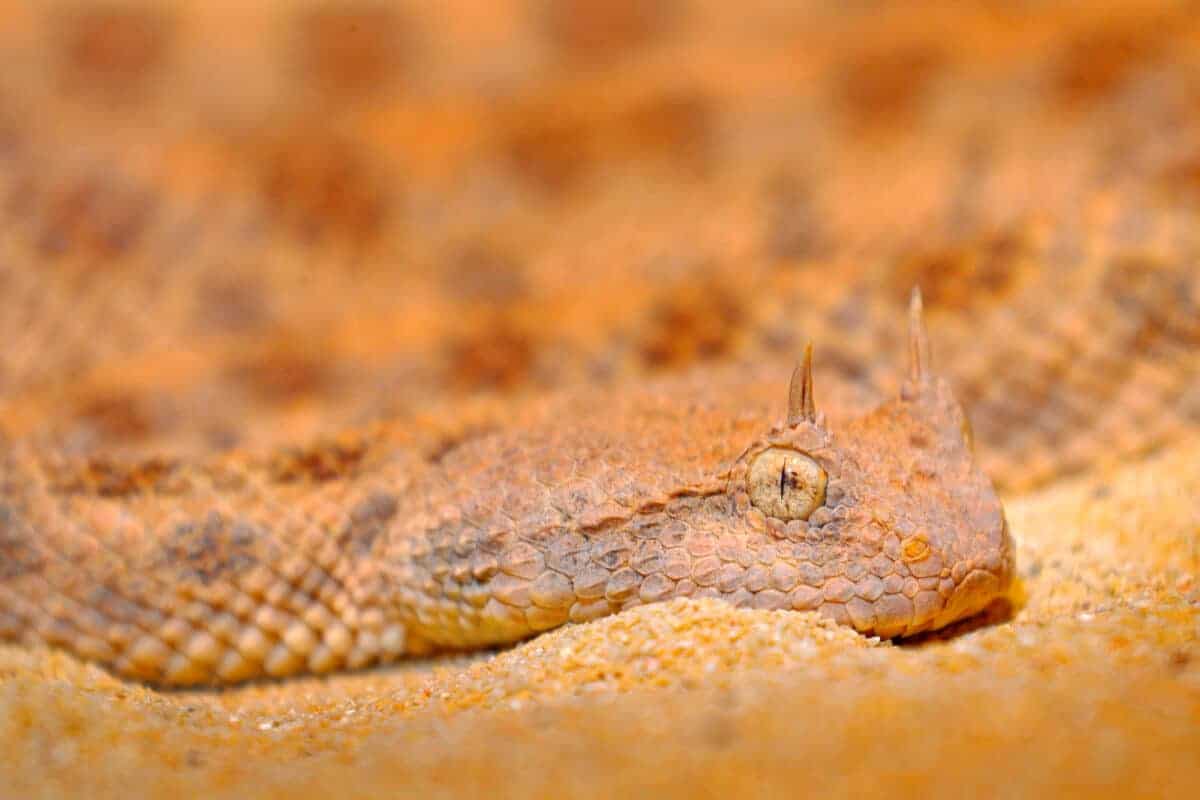
Horned viper snakes are venomous and should be approached with caution.
They are easily recognizable due to their distinctive horns and coloration. Yet they are also sought after by collectors and hunters for their horns and colors.
If you are bitten by a horned viper snake, seek medical attention immediately to receive antivenom treatment.
It is important to respect the habitat of horned viper snakes. Furthermore, practice safe hiking and camping techniques to avoid potential dangers and encounters with these snakes.
Snakes like the horned viper play a vital role in their ecosystem. Therefore, it is imperative to recognize the unique characteristics and contributions these snakes make.
Desert horned vipers can reach just over two feet (61cm ) in length.
They are most active at night and spend their days hiding in deserted rodent burrows and under rocks. They also bury themselves in the sand to keep cool and hide from predators.
These snakes decrease their activity during the winter and become reproductive with the onset of spring.
The female lays eight to almost two dozen eggs in an abandoned burrow or under a rock. These incubate for 50 to 80 days before the young hatch.
It takes them two years to reach reproductive maturity, and it’s unknown how long they live in the wild, though they’re known to live up to eighteen years in captivity.
The Wrap Up
A bite from the horned viper can certainly be survived and overcome. While it may not be pleasant to endure the effects of a horned viper bite, the vast majority of bites result in no lasting physical damage.
So never try to provoke them. But if you ever find yourself in an unfortunate situation involving one, just remember that careful medical attention can make all the difference.
They may be feared by many, but they should also be respected for their ability to survive in even the harshest environments.
Interacting with this species gives us an opportunity to explore fascinating aspects of their biology. But while also helping us ensure their conservation in the future.
If you enjoyed this article, see below for our related animal articles!
Next up: Boomslang Snake Bite, The Most Ferocious Freshwater Predator: The Piranha, The World’s Most Powerful Mammal: The Mighty African Elephant, Explore Georgia’s Black Bear Population, and Wildlife Spotlights: Gorilla And Anaconda In Focus.
- Python Swallows An Adult Crocodile - April 27, 2024
- Watch: Impala vs Leopard High-Speed Chase - April 27, 2024
- 6 Animals That Could Defeat A Grizzly Bear - April 27, 2024

